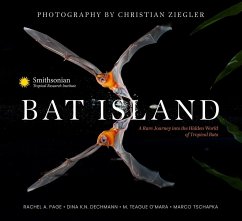Rachel A Page, Dina K N Dechmann, M. Teague O'Mara, Marco Tschapka, The Smithsonian Tropical Research Institute
Bat Island
A Rare Journey Into the Hidden World of Tropical Bats
Fotograf: Ziegler, Christian
Rachel A Page, Dina K N Dechmann, M. Teague O'Mara, Marco Tschapka, The Smithsonian Tropical Research Institute
Bat Island
A Rare Journey Into the Hidden World of Tropical Bats
Fotograf: Ziegler, Christian
- Gebundenes Buch
- Merkliste
- Auf die Merkliste
- Bewerten Bewerten
- Teilen
- Produkt teilen
- Produkterinnerung
- Produkterinnerung
Bat Island spotlights the unique beauty and environmental importance of the seventy-six species of bats on Panama's Barro Colorado Island.
Andere Kunden interessierten sich auch für
![The Mission The Mission]() Swami B B BodhayanThe Mission18,99 €
Swami B B BodhayanThe Mission18,99 €![Guru: The Universal Teacher Guru: The Universal Teacher]() Swami B P PuriGuru: The Universal Teacher22,99 €
Swami B P PuriGuru: The Universal Teacher22,99 €![Noisy Autumn Noisy Autumn]() Noisy Autumn39,99 €
Noisy Autumn39,99 €![The medical meditation diary: From practice for practice The medical meditation diary: From practice for practice]() Serhat UcarerThe medical meditation diary: From practice for practice9,99 €
Serhat UcarerThe medical meditation diary: From practice for practice9,99 €![Amma Therapy Amma Therapy]() Tina SohnAmma Therapy51,99 €
Tina SohnAmma Therapy51,99 €![Empower Yourself Against Vitiligo Empower Yourself Against Vitiligo]() Elena NuniariEmpower Yourself Against Vitiligo14,99 €
Elena NuniariEmpower Yourself Against Vitiligo14,99 €![The Art of Teaching The Art of Teaching]() The Art of Teaching10,99 €
The Art of Teaching10,99 €-
-
-
Bat Island spotlights the unique beauty and environmental importance of the seventy-six species of bats on Panama's Barro Colorado Island.
Hinweis: Dieser Artikel kann nur an eine deutsche Lieferadresse ausgeliefert werden.
Hinweis: Dieser Artikel kann nur an eine deutsche Lieferadresse ausgeliefert werden.
Produktdetails
- Produktdetails
- Verlag: Insight Comics
- Seitenzahl: 160
- Erscheinungstermin: 21. November 2023
- Englisch
- Abmessung: 284mm x 215mm x 17mm
- Gewicht: 1370g
- ISBN-13: 9798887620398
- Artikelnr.: 67796789
- Herstellerkennzeichnung
- Libri GmbH
- Europaallee 1
- 36244 Bad Hersfeld
- 06621 890
- Verlag: Insight Comics
- Seitenzahl: 160
- Erscheinungstermin: 21. November 2023
- Englisch
- Abmessung: 284mm x 215mm x 17mm
- Gewicht: 1370g
- ISBN-13: 9798887620398
- Artikelnr.: 67796789
- Herstellerkennzeichnung
- Libri GmbH
- Europaallee 1
- 36244 Bad Hersfeld
- 06621 890
Christian Ziegler (www.christianziegler.photography) is a German photojournalist specializing in natural history and science, with a focus on tropical ecosystems. Ziegler currently works for the Max Planck Institute of Animal Behavior in Konstanz, Germany, and is a regular contributor to National Geographic. His work has been awarded numerous prizes in the competitions for Wildlife Photographer of the Year, European Wildlife Photographer of the Year, and the North American Nature Photography Association. A tropical ecologist by training, Ziegler has been associated with STRI for over twenty-five years since he started his own graduate research on Barro Colorado Island. He has since worked in tropical rainforests on four continents. Ziegler’s aim is to highlight species and ecosystems under threat and to share their beauty and importance with the world. Ziegler splits his time between his homes on the edge of a rainforest national park in central Panama and in southern Germany, from where he starts his adventures around the world. Dr. Rachel A. Page is a staff scientist at the Smithsonian Tropical Research Institute in Panama, where she leads the Smithsonian Bat Lab (www.noseleaf.org). She is broadly interested in animal behavior, but her focus is understanding the sensory and cognitive tools bats use to navigate their worlds and interact with each other. After completing a BA at Columbia University and a PhD at the University of Texas at Austin, Page conducted postdoctoral research as an Alexander von Humboldt fellow at the Max Planck Institute for Ornithology in Seewiesen, Germany. Page has studied bats on Barro Colorado Island and the surrounding areas for over two decades. She has a passion for understanding rich, tropical ecosystems and the myriad species interactions they encompass. In addition to conducting her own research, Page mentors a large group of students. Page lives at the edge of the rainforest in Gamboa, Panama. Dr. Dina K.N. Dechmann is a group leader at the Max Planck Institute of Animal Behavior (www.ab.mpg.de/dechmann) and a research associate at the Smithsonian Tropical Research Institute. An evolutionary ecologist by training, her main research interest is how animals adapt to fluctuations in the resources upon which they depend. She is fascinated by how tiny mammals with fast metabolisms, such as bats and shrews, adapt their morphology, physiology, and behavior to deal with the bottlenecks created by changes in the food landscape. She works in ecosystems across the world, but since her first visit to BCI in 2000, she has been struck by the diversity of the tropical bat community, which remains a cornerstone of her research. She received her master’s degree at the Swiss Federal Institute of Technology (ETH) in Zurich followed by a PhD at the University of Zurich, and was a postdoctoral fellow at the Leibniz Institute for Zoo and Wildlife Research in Berlin. Since she was hired by Max Planck in 2009, she has had the good fortune to supervise a group of brilliant young minds, several of whom now run their own projects in Panama. Dechmann lives in the medieval town of Stein am Rhein in Switzerland. Dr. M. Teague O’Mara is the Director of Conservation Evidence at Bat Conservation International, where he works on data-driven strategies for the conservation of global bat populations. O’Mara has studied animal behavior, movement, and physiology across the globe, with an emphasis on bats in Panama. He is a research associate at the Smithsonian Tropical Research Institute and the Max Planck Institute of Animal Behavior, and an adjunct professor at Southeastern Louisiana University. He received his PhD from Arizona State University studying lemur development and social behavior, and then switched to research with bats during postdoctoral work at the Smithsonian Tropical Research Institute, the University of Konstanz, and the Max Planck Institute of Animal Behavior in Germany. He lives in Baton Rouge, Louisiana. Dr. Marco Tschapka is a professor at the University of Ulm in Germany and a research associate at the Smithsonian Tropical Research Institute. His research addresses bat-plant interactions, with a focus on the ecology of Neotropical nectar-feeding bats, their adaptations to nectarivory, and the plants they visit and pollinate. Tschapka received his master’s degree and PhD with Dr. Otto von Helversen at the University of Erlangen, Germany, on Neotropical flower-visiting bats. Together with his collaborators and students, he has worked on bat projects across Latin America, including in Mexico, Costa Rica, Ecuador, Peru, Brazil, and Panama. He lives in Ulm, Germany. The Smithsonian Tropical Research Institute, headquartered in Panama City, Panama, is a unit of the Smithsonian Institution in Washington, D.C., USA. The institute furthers the understanding of tropical biodiversity and its importance to human welfare, trains students to conduct research in the tropics, and promotes conservation by increasing public awareness of the beauty and importance of tropical ecosystems and their cultures.








